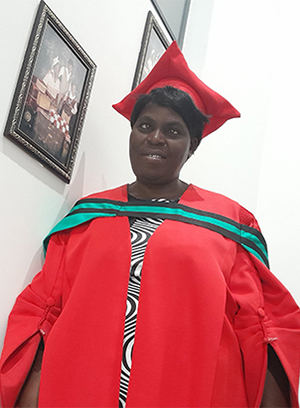College of Education
Persistence holds the key for visually impaired Dr Mlambo

Dr Farisai Mlambo
Dr Farisai Mlambo, who is also a mother of four children, is more testimony that Unisa’s reach has no limit and that the university’s efforts are indeed shaping Africa’s intellectual futures in the service of humanity.
Mlambo is a visually impaired lecturer who resides in the Masvingo Province in Zimbabwe. She lectures at the Great Zimbabwe University, in the Department of Teacher Development English Unit, with a keen interest in research topics based on inclusivity matters, particularly visual impairment. Her teaching areas include children’s literature, poetry, literary theories and criticism, linguistics and oral literature, among others.
Describing her disability, Mlambo says she had measles when she was six years old, which gradually caused her to develop low vision. As a result, she uses braille and has an aid. Her husband, who works at Masvingo General Hospital as a Rehabilitation Technician, is totally blind.
Mlambo obtained a Doctor of Philosophy in Education (DPhil Education) at Unisa. She says: "This qualification will assist me in gaining unique skills that can open doors to the highest levels of my profession." She adds: "It will also assist me in venturing into other international posts such as lecturing in South Africa and other well-known institutions of higher learning which have a global footprint."
Closer to her heart is to lecture and mentor students with disabilities. "I want to be an inspiring example, especially to women, and show them that there is no glass ceiling because of their disability," she says.
Tunnelling the narrow path
Sharing some of the challenges she encountered, she remarks: "Since my research was done online, I had problems with internet connectivity, and bundles were costly." However, even though she lacked adequate resources, Mlambo did not give up on her studies. She says: "I had to soldier up because Unisa assisted me with fees for my studies through the bursary office." She states: "The bursary I got from Unisa played a crucial role in my academic journey, and I feel honoured and valued by the university."
Mlambo says that although there might be many barriers, challenges, discrimination and stigmatisation, as a woman with a disability, these are not barriers to curtail your aspirations and goals. She asserts: "While it might take longer to accomplish your objectives compared to someone who is not visually impaired, persistence holds the key at the end of it all."
She also encourages women living with disabilities, especially those studying at Unisa, to continue doing so. "Unisa is one of the best universities for disabled people," she concludes.
* By Godfrey Madibane, Unisa Radio Journalist, Department of Institutional Advancement
Publish date: 2022/10/18

 Unisa co-hosts G20 community outreach in the Eastern Cape
Unisa co-hosts G20 community outreach in the Eastern Cape
 Unisans gain membership of prestigious science academies
Unisans gain membership of prestigious science academies
 Advocating for disability transformation through servant leadership
Advocating for disability transformation through servant leadership
 Unisa Press continues to illuminate the publishing space
Unisa Press continues to illuminate the publishing space